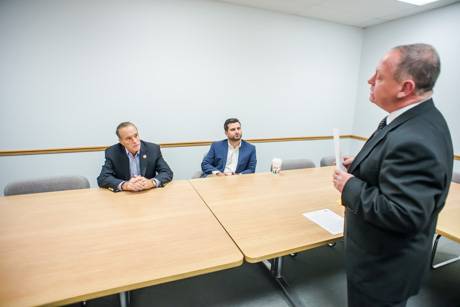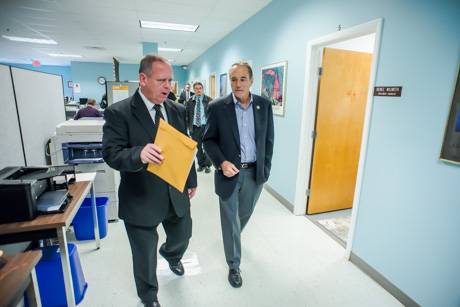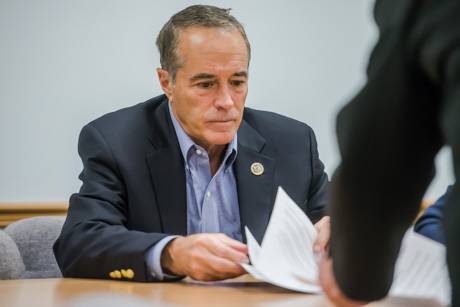
Rep. Chris Collins toured the offices of the county's Job Development Bureau this morning to learn more about the work the department does to help people in Genesee County find jobs.
The tour, led by Jay Lazarony, GLOW Workforce Development Board executive director, focused on the Workforce Innovation and Opportunity Act (oWOIA), which is a federal program designed to help youth and those with significant barriers to employment find and retain high-quality jobs and careers.
Many of the clients who enter the program have not developed the job skills that help them retain jobs.
Lazarony told the story of one woman who entered the program who had been working as a home health care aide but couldn't stay in a job. The training she received helped her understand what it takes to hold onto a job and also provided her with the skills to become a Certified Nursing Assistant. The program helped her with the expense of travel, shoes, and scrubs. She eventually landed a full-time job at the Genesee County Nursing Home and now she's studying to become a Registered Nurse.
"This is the stuff that we can do with that funding, is give people a great start," Lazarony told Collins.
Collins said he appreciated the insight because so often the programs that pass before congressional members for review are just numbers on a page but the tour helped him see how the program benefits people.
So far in 2017, the center has helped 989 clients, including 141 through WIOA. A total of 137 veterans have been assisted.
There have been 1,322 people placed in jobs in Genesee County through the department's services.
Collins also learned about on-the-job-training programs through 13 participating businesses, occupational training programs, 38 on-site employer-specific job recruitment sessions, and the Summer Youth Employment program that placed 39 high school students in jobs at 23 work sites this summer.
Sometimes the clients of the center need ongoing help, said Scott Gage, director of the bureau.
"We’ll actually stay with them for 12 months after they leave us," Gage said. "We can mediate anything going on with the business, help this person out with issues. We’ve got a lot of community partners we rely on to help us out, social service agencies that will help us out in a number of ways and there’s no funding involved. They provide services and we access those services."
There are currently more than 600 job listings on file with the bureau and most of those are good-paying jobs, Gage said. With local unemployment at about 4 percent, it's proving hard for companies to find skilled workers.
The tight job market is helping to bring some people into the workforce who until now had opted out, Lazarony said. He said two recent clients the bureau has placed in jobs have worked their way up to full-time employment. They were in their mid-20s when they first came in and had never worked any type of job in their lives. They weren't part of the system at all. They just lived at home and didn't work.
There are other long-term unemployed who rely on the state's Safety Net program and they can be hard to assist, Gage said. They're capable of working, but they also have other underlying issues, such as disabilities, and sometimes they've just given up. That's a challenge, Gage said.
Collins observed that "Anybody who wants to get a job can get a job. It may not be at the wage they want, or the hours they want, or the job they want, but they can get a job."
Changes in aid programs initiated by Congress might change some of that, Collins said.
"As we continue down that road you’re going to start to see people lined up out your door," Collins said.


